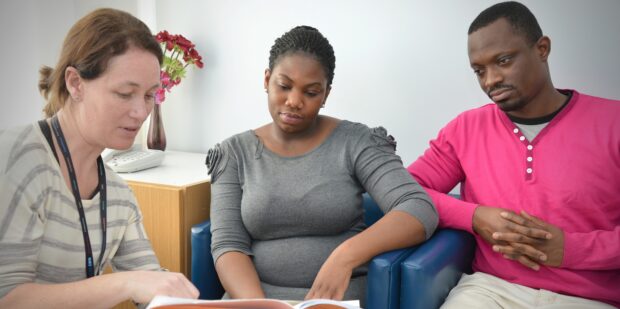I have been one of the antenatal and newborn screening coordinators for Calderdale and Huddersfield for the past 4 years.
I had a lightbulb moment to apply for the genetic risk and counselling course at King’s College London. This happened when I was asked to see a couple, one of whom carried the Beta thalassaemia gene and the other carried the Alpha thalassaemia gene.
I had to seek advice from the local laboratory lead technician (Biomedical scientist) as I felt out of my depth when counselling the couple. I knew then that I needed to plug this gap in my knowledge and increase my confidence in dealing with these situations.

The NHS SCT Screening Programme is pleased to announce the next dates for the 4-day KCL genetic risk and counselling course:
- 10 and 11 May 2018
- 14 and 15 June 2018
You can book a place via the Kings College London website. The programme also has a number of bursaries available to eligible professionals. Apply here for a bursary.
I would strongly encourage anyone considering applying for this course to take the plunge. The application process is easy and simple to complete. The course is 30 credits at degree or masters level. There are bursaries available via PHE and I was very fortunate to obtain one of these.
The course gives students an in depth knowledge of haemoglobin disorders and the practical applications of genetics in healthcare. It helped expand my knowledge and skills on the impact of sickle cell disease and thalassaemia on pregnant women and their families. It includes opportunities to develop counselling skills when advising couples who are healthy carriers about the diseases, prenatal testing and subsequent reproductive choices. I found this part of the course invaluable.
Increasingly we work with multi-racial and multi-cultural populations who may have limited knowledge about inheritance risks of sickle cell disease and thalassaemia. My learning from this course will allow me to better interpret results and work with and educate women, families and colleagues. My counselling toolbox now includes the ability to discuss modes of inheritance, genetic risks and prenatal diagnosis.
We do not have a prenatal haemoglobinopathy counsellor available in my trust so there is a reliance on the screening team to provide this service. As a result of attending this course I am better equipped to provide a patient-centred service with new and improved knowledge and skills.
The course includes 4 days of classroom learning at King’s College London and is facilitated by experts in the field. The lecturers make the course interesting, thought provoking and include lots of interactive sessions. I am not usually but I have to admit that I enjoyed and benefited from the role-play sessions.
There are also plenty of opportunities to network with enthusiastic colleagues from across the country, many of whom I am still in touch with. In fact we are planning a reunion in October. We gained as much learning from each other’s experiences as we did from the course. You will learn more than you think from the course and gain a few more friends along the way!
PHE Screening blog
PHE Screening BLOG articles provide up to date news from all NHS screening programmes. You can register to receive updates direct to your inbox, so there’s no need to keep checking for new blog articles.
1 comment
Comment by Sara posted on
Its a great thing to create awareness and confidence among people about the thalassemia and sickle cell. The patient should understand everything about his/her condition. By this, they can be prepared for what is coming. A counseling is a must.